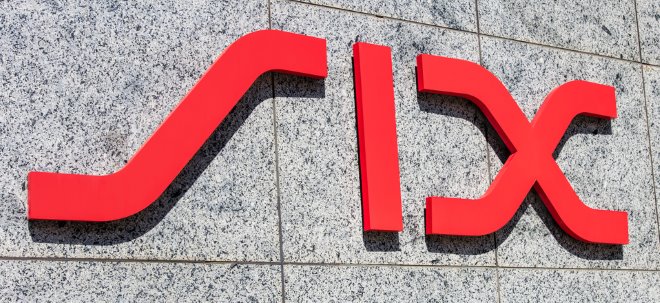Shell Plans to Cut New Offshore Wind Spend, Split Power Division
Werte in diesem Artikel
Shell plc SHEL, one of the world's most prominent energy giants, has announced it will scale back its involvement in new offshore wind investments in a move that marks a significant departure from its previous commitments to renewable energy. The integrated oil and gas company has also revealed plans to restructure its power division, a decision that stems from a comprehensive review of SHEL’s operations launched in 2023.This extensive review, led by CEO Wael Sawan, has set the stage for a new era at Shell, one that is refocusing on higher-return ventures while cutting back on expenditures in low-carbon and renewable energy businesses.The decision to pull back from offshore wind development comes at a time when renewable energy projects, particularly in the offshore wind sector, are facing growing economic challenges. Rising costs, supply-chain disruptions and an overall uncertain investment climate have led Shell to reassess its approach. While the offshore wind was once touted as a key pillar of Shell’s energy transition strategy, these recent challenges have prompted it to refocus on oil, gas and biofuels, sectors seen as offering more immediate returns.Shell’s Strategic Shift: A Response to Market RealitiesLondon-based company’s new direction represents a shift in its energy transition goals. Shell’s statement makes this clear that while the company will not lead new offshore wind developments, it remains open to exploring equity positions and offtake agreements in the sector, provided the terms are financially viable. This cautious stance highlights a broader trend within the energy industry, as major players like BP plc BP and Equinor ASA EQNR have also scaled back their investments in renewables in response to rising interest rates, increased capital costs and narrowing profit margins within the sector.Despite this retreat, Shell has highlighted that it will continue to support the offshore wind projects already in development. The company recently scaled back its involvement in offshore wind projects in regions like South Korea and the United States. However, its ongoing investments in existing projects signal that Shell still sees value in the sector when commercial terms are right.Shell Energy Split: Streamlining Operations for Greater FocusAs part of the restructuring effort, Shell has also announced the split of its Shell Energy division into two distinct units-Shell Power and Shell Energy. This organizational overhaul is designed to improve the company’s ability to execute its plans with greater focus and accountability.Shell Power, headed by Greg Joiner, will primarily focus on power generation and energy trading. Meanwhile, Shell Energy, under the leadership of David Wells, will handle renewables, battery storage and the supply of energy to its customers. By splitting these functions, Shell aims to enhance the efficiency and clarity of its operations, ensuring each unit can focus on the company’s core competencies.In line with this restructuring, Shell has signaled that it will place greater emphasis on technologies that can support the intermittency of renewable energy. For example, the company plans to invest more in battery storage and flexible gas-fired power plants, which can complement renewable energy sources by providing stable and reliable electricity when solar or wind power is not available. This approach represents a hybrid strategy that blends traditional energy sources with emerging green technologies.Shell’s Commitment to Fossil FuelsWhile Shell’s commitment to renewables may have cooled, its focus on natural gas and biofuels is heating up. The company’s review under Sawan has made it clear that liquefied natural gas will be a key growth area for Shell, with plans to expand the division further. Additionally, Shell has committed to stabilizing its oil production by the end of the decade, signaling a shift back toward traditional fossil fuels amid rising demand for gas and oil globally.This move aligns with Shell’s broader strategy to increase its shareholder value by capitalizing on the stability and profitability of fossil fuels. As demand for natural gas continues to rise, especially in the wake of Russia’s invasion of Ukraine, which has disrupted global energy markets, Shell appears committed to meeting this demand and boosting its bottom line.Investor Pressure and the Future of Renewables at ShellShell’s recent restructuring also indicates a growing wave of investor pressure for the company to boost returns and maintain its shareholder payouts. As energy prices have fluctuated, especially following the energy crisis exacerbated by the Ukraine conflict, the company has faced mounting demands to deliver consistent returns to its investors. This has led to the scaling back of ambitions in offshore wind, solar energy and even hydrogen projects, as these initiatives have become harder to justify financially.The changes at Shell have sparked concerns among climate-focused investors and activists, particularly after the company weakened its 2030 carbon reduction targets and scrapped 2035 carbon-neutrality goal. These moves have drawn criticism from environmental groups who argue that Shell’s retreat from renewables undermines the global push for climate action. Nonetheless, the company maintains that it will continue to support low-carbon projects where these align with Shell’s financial goals.Shell’s Path Forward: Navigating Energy Transition ChallengesAs Shell moves forward, its new strategy indicates the broader challenges facing the global energy sector. Transitioning to a low-carbon economy remains a priority for many companies, but the economic hurdles associated with such a shift are proving to be formidable. Shell’s recalibration highlights the delicate balance that energy companies must strike between financial stability and sustainability.Looking ahead, Shell’s investment in oil, gas and biofuels implies that the company will continue to play a dominant role in the global energy market for years to come. However, its future in renewables remains uncertain, as the company seeks to strike a balance between traditional energy and green technologies in an ever-evolving marketplace.Zacks RankCurrently, SHEL, BP and EQNR all have a Zacks Rank of #3 (Hold). You can see the complete list of today’s Zacks #1 Rank (Strong Buy) stocks here.5 Stocks Set to DoubleEach was handpicked by a Zacks expert as the #1 favorite stock to gain +100% or more in 2024. While not all picks can be winners, previous recommendations have soared +143.0%, +175.9%, +498.3% and +673.0%.Most of the stocks in this report are flying under Wall Street radar, which provides a great opportunity to get in on the ground floor.Today, See These 5 Potential Home Runs >>Want the latest recommendations from Zacks Investment Research? Today, you can download 7 Best Stocks for the Next 30 Days. Click to get this free report BP p.l.c. (BP): Free Stock Analysis Report Equinor ASA (EQNR): Free Stock Analysis Report Shell PLC Unsponsored ADR (SHEL): Free Stock Analysis ReportTo read this article on Zacks.com click here.Zacks Investment ResearchWeiter zum vollständigen Artikel bei Zacks
Ausgewählte Hebelprodukte auf Shell (ex Royal Dutch Shell)
Mit Knock-outs können spekulative Anleger überproportional an Kursbewegungen partizipieren. Wählen Sie einfach den gewünschten Hebel und wir zeigen Ihnen passende Open-End Produkte auf Shell (ex Royal Dutch Shell)
Der Hebel muss zwischen 2 und 20 liegen
| Name | Hebel | KO | Emittent |
|---|
| Name | Hebel | KO | Emittent |
|---|
Quelle: Zacks
Nachrichten zu Shell (ex Royal Dutch Shell)
Analysen zu Shell (ex Royal Dutch Shell)
| Datum | Rating | Analyst | |
|---|---|---|---|
| 16.12.2024 | Shell (ex Royal Dutch Shell) Buy | Jefferies & Company Inc. | |
| 10.12.2024 | Shell (ex Royal Dutch Shell) Buy | Goldman Sachs Group Inc. | |
| 09.12.2024 | Shell (ex Royal Dutch Shell) Overweight | JP Morgan Chase & Co. | |
| 06.12.2024 | Shell (ex Royal Dutch Shell) Neutral | UBS AG | |
| 05.12.2024 | Shell (ex Royal Dutch Shell) Outperform | RBC Capital Markets |
| Datum | Rating | Analyst | |
|---|---|---|---|
| 16.12.2024 | Shell (ex Royal Dutch Shell) Buy | Jefferies & Company Inc. | |
| 10.12.2024 | Shell (ex Royal Dutch Shell) Buy | Goldman Sachs Group Inc. | |
| 09.12.2024 | Shell (ex Royal Dutch Shell) Overweight | JP Morgan Chase & Co. | |
| 05.12.2024 | Shell (ex Royal Dutch Shell) Outperform | RBC Capital Markets | |
| 15.11.2024 | Shell (ex Royal Dutch Shell) Buy | Jefferies & Company Inc. |
| Datum | Rating | Analyst | |
|---|---|---|---|
| 06.12.2024 | Shell (ex Royal Dutch Shell) Neutral | UBS AG | |
| 01.11.2024 | Shell (ex Royal Dutch Shell) Neutral | UBS AG | |
| 31.10.2024 | Shell (ex Royal Dutch Shell) Neutral | UBS AG | |
| 08.10.2024 | Shell (ex Royal Dutch Shell) Neutral | UBS AG | |
| 05.07.2024 | Shell (ex Royal Dutch Shell) Neutral | UBS AG |
| Datum | Rating | Analyst | |
|---|---|---|---|
| 26.08.2020 | Shell (Royal Dutch Shell) (A) Underweight | Barclays Capital | |
| 29.11.2017 | Shell B Sell | Citigroup Corp. | |
| 29.11.2017 | Shell (Royal Dutch Shell) (A) Sell | Citigroup Corp. | |
| 29.11.2017 | Shell B Sell | Citigroup Corp. | |
| 30.01.2015 | Royal Dutch Shell Grou b Sell | S&P Capital IQ |
Um die Übersicht zu verbessern, haben Sie die Möglichkeit, die Analysen für Shell (ex Royal Dutch Shell) nach folgenden Kriterien zu filtern.
Alle: Alle Empfehlungen


